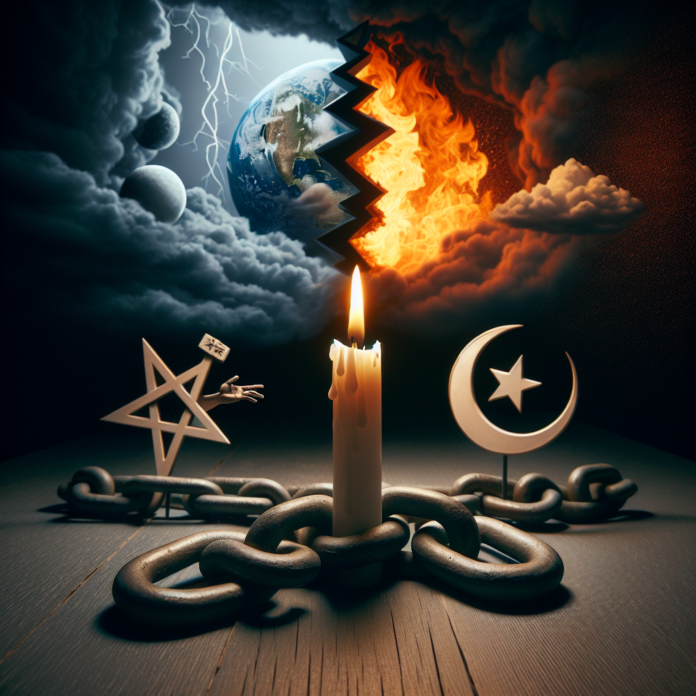The Dangerous Synergy Between Pro-Life Extremism and Religious Doctrine
In a world increasingly embroiled in culture wars, the nexus between pro-life extremism and religious doctrine has emerged as one of the most potent and pervasive forces against progressive values. This alliance, most notably manifest in Catholic conservatism but spanning multiple religious traditions, poses significant challenges to individual rights and societal advancements. While faith has historically provided moral guidance and community cohesion, its entanglement with extremist views on reproductive rights has produced an alarming regression in human freedoms, especially for women.
The roots of this synergy can be traced back centuries, to eras when religious dogma held unquestionable authority over societal norms. Traditionalist views have long dictated the roles of women, often relegating them to a status subordinate to their male counterparts. These views were not just cultural but were often enshrined in religious doctrine, creating a paradigm that resisted the tides of progressive change.
Take, for example, the mid-20th century, a period ripe with civil rights movements and the fight for gender equality. The Catholic Church, guided by an unyielding allegiance to its doctrines, took a firm stance against the burgeoning women’s rights movement. Pope Paul VI’s 1968 encyclical "Humanae Vitae" is emblematic of this resistance. It reaffirmed the Church’s opposition to artificial contraception, a position that not only flew in the face of advancing scientific understanding and societal needs but also significantly constrained women’s autonomy over their own bodies.
Fast forward to the 21st century, and the synergy between pro-life extremism and religious doctrine remains as potent as ever. Recent headlines reveal a troubling trend of laws and policies shaped by these intertwined ideologies. In the United States, the repeal of Roe v. Wade in 2022 epitomizes this backlash against reproductive rights. A conservative majority in the Supreme Court, influenced by decades of religious lobbying and anti-abortion activism, dismantled nearly half a century of established precedent that safeguarded a woman’s right to choose.
This decision spurred a cascade of restrictive abortion laws in various states, emboldened by religiously motivated policymakers. States like Texas introduced legislation that not only bans abortions after six weeks—often before many women even realize they are pregnant—but also allows private citizens to sue those who assist in procuring abortions, effectively turning neighbor against neighbor. Such measures underscore the dangerous extent to which pro-life extremism, underpinned by religious doctrine, can intrude upon personal liberties and promote vigilantism.
Moreover, the insidious nature of this alliance is evident in the way it marginalizes those who do not conform to its rigid beliefs. LGBTQ+ individuals, couples seeking fertility treatments, and women in disadvantaged socio-economic positions find themselves particularly vulnerable. The dogma that personhood begins at conception, a cornerstone of Catholic conservatism, criminalizes actions that many see as essential expressions of personal freedom and medical necessity. In doing so, it inflicts disproportionate harm on already marginalized communities, perpetuating cycles of discrimination and inequity.
Internationally, the picture is similarly bleak. In countries with significant Catholic influence, such as Poland and Brazil, strict abortion laws reflect the oppressive weight of this traditionalist alliance. Poland’s near-total ban on abortion—even in cases of fetal abnormalities—has provoked widespread protests and international condemnation. In Brazil, President Jair Bolsonaro’s administration, heavily backed by evangelical Christians, has rolled back reproductive rights, promoting an agenda that conflates state policy with religious morality.
However, opposition to this dangerous synergy is growing. Progressive movements worldwide are pushing back, advocating for a reimagining of societal values that prioritize personal freedom, scientific understanding, and compassion over rigid dogma. In Ireland, a predominantly Catholic country, the successful 2018 referendum to repeal the Eighth Amendment—which heavily restricted abortions—marked a significant victory for reproductive rights and a rejection of religiously motivated extremism. This progressive momentum is critical in countering the regression spearheaded by pro-life extremism.
To combat the influence of this alliance, education and advocacy are paramount. Comprehensive sex education, accessible healthcare, and support systems that empower individuals to make informed choices about their bodies are essential components of this progressive vision. Furthermore, the separation of church and state must be vigilantly upheld to ensure that policy decisions respect the diverse beliefs and rights of all citizens, rather than being dictated by the religious convictions of a powerful few.
In conclusion, the synergy between pro-life extremism and religious doctrine, particularly as embodied in Catholic conservatism, represents a formidable challenge to progressive values and individual liberties. By recognizing the historical roots and contemporary manifestations of this alliance, society can better mobilize to safeguard human rights and promote a future where personal autonomy is respected and upheld. Bridging the gap between tradition and progress requires a concerted effort to champion values that foster inclusion, equity, and respect for all, steering the world towards a more compassionate and just path.
